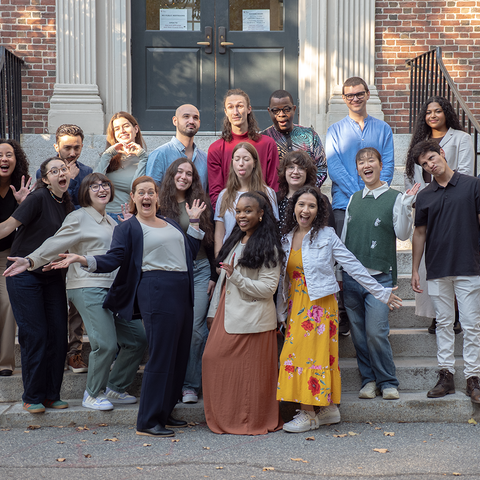They genuinely looked forward to her three-hour section that started at 7 p.m. One of the many laudatory comments by students about Mariel Young, a PhD student in the Department of Human and Evolutionary Biology. Mariel has a reputation not only as an excellent scientist but as a future leader in science education. “In the five years that I have mentored Mariel, it is clear that she is most passionate about teaching,” says Terence D. Capellini, Richard B. Wolff Associate Professor of Human Evolutionary Biology. “This is demonstrated by her active desire to improve her pedagogical training and organize programs that improve the training of other educators.”
Over the past three years, Mariel has served as a teaching fellow for “Human Evolution and Human Health,” “Evolutionary Human Physiology and Anatomy,” and “Human Evolutionary Anatomy.” When her first evaluations gave her a 4.0/5.0 (“very good”) overall Q score, Mariel was determined to improve; she decided that a key part of teaching is learning how to connect with her students so that she could better evaluate them. As a result of her commitment to pedagogical skills, her scores increased, and overall, more than 81 percent rated her “excellent.” She has never received an evaluation below 3.
In evaluations, students enthusiastically praise Mariel. “My actual savior, she taught me more than I thought possible,” wrote one student. Another recognized her for going above and beyond. “When I struggled on the first midterm, she offered her help and invited me to both her office hours and special appointments. More than any other TF I’ve had in a science course at Harvard, I felt like Mariel cared that her students did well and thrived in the class.”
As a Bok Teaching Fellow, Mariel co-organized, designed, and taught the Bok Seminar “Communicating Science,” in which 15 STEM graduate students and post-docs learned various methods of science communication. This activity demonstrates Mariel’s effort to equip a generation of scientists with the skills needed to foster science education. Not only does she take great pride in educating the general public on her own evolutionary science research, she believes that by improving the communication skills of scientists, she will have a broader impact on this national issue. “I have been inspired by her continued efforts,” says Capellini, “especially as she has battled as a woman in STEM science and mastered computational and wet-lab skills in fields typically dominated by men.”
Mariel, the Graduate School of Arts and Sciences is pleased to present you with the Derek C. Bok Award for Excellence in Graduate Student Teaching of Undergraduates. Congratulations!
Read More about the 2019 Bok Awards




